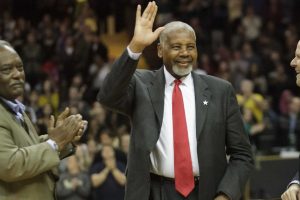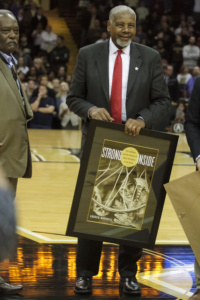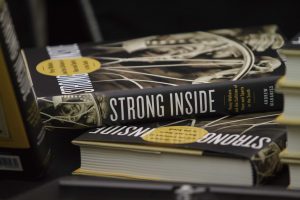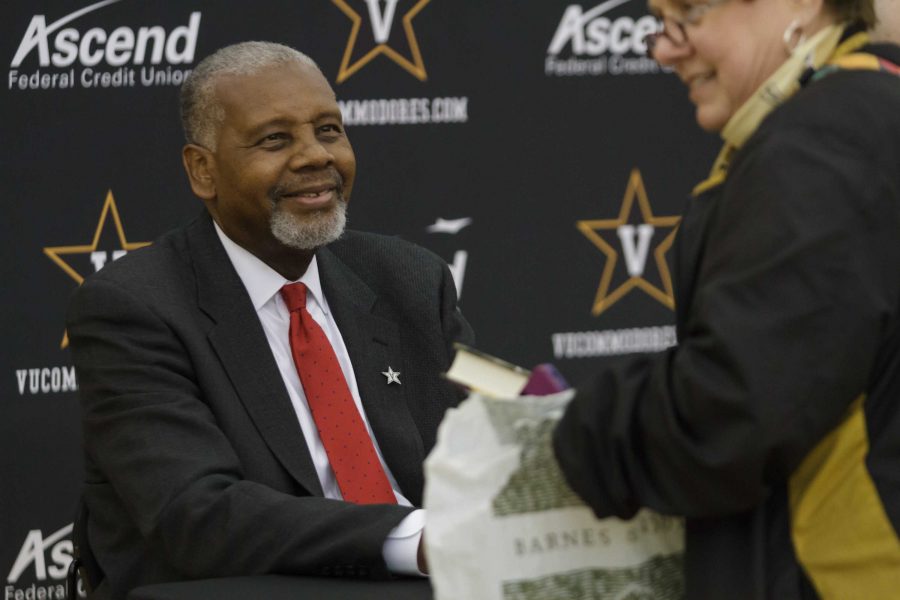In the days following the death of former Vanderbilt basketball icon Perry Wallace, tributes have poured in for the trailblazer that broke the SEC basketball color barrier.
Those who knew Wallace best have had nothing but glowing things to say about him. We spoke with Andrew Maraniss, author of Wallace’s biography, “Strong Inside,” as well as other Vanderbilt alumni that knew Wallace, and asked them to reflect on his life and legacy.
This is what they told us.
Andrew Maraniss
The Vanderbilt Hustler: Overall, people on campus are surprised because Perry’s death seemed very sudden. Can you explain what happened?
Andrew Maraniss: Perry had cancer for a couple of years. I think he was a very private person, so it wasn’t something that he talked about a lot. Just within the last several weeks, it really spread through his body. And so I knew it was something that he was battling, but I was also surprised when I heard it was getting to a point where it was going to take his life soon. So I do think it was a surprise to a lot of people who have come to admire him over the last couple years. He was such a larger than life figure, so in some ways I think it felt like he would always be this inspiration out there. We were lucky that we had him to admire here at Vanderbilt for as long as we did.
VH: I guess that speaks to how impressive it is that you got him to open up so much for the book, considering he’s such a private person. Do you feel honored in that sense?
AM: I always felt extremely humbled and honored that Perry would talk to me. First, when I was a student here for a paper for a black history course. I just called him on the phone out of the blue, and he spent two hours on the phone talking to me. The next year, I was the Sports Editor of the Hustler and I interviewed him some more and wrote several articles about him. But I always felt special, to have that opportunity. And he was like a teacher, father figure and mentor to me since I was 19 years old. And that always made me feel good about myself. It gave me a bit of purpose–as a student, in life, as an author–to have this really impressive person to write about who had a story that I felt like was full of courage and he was such an impressive person that he deserved to have his story told and I always felt very honored that he would work with me to help him tell it.
Who are the people here on your campus at your time that for whatever reason are treated as if they’re on the periphery?
-Andrew Maraniss
VH: What do you think Vanderbilt students can learn from Perry’s life and the way he led it?
AM: I think one of the most important lessons is simply about being a good human being and recognizing other people for who they are, and respecting them no matter who they are, stepping up beyond yourself and beyond your little clique of friends to reach out to other people who may be having a difficult experience on campus. For Perry, people sort of gravitate to these stories of him playing road games in Mississippi and Alabama and how hard that was and how mean the fans were to him there, and how he thought that he might get killed just for stepping onto the basketball court. He thought he might get shot. But he always said the most difficult part of his experience wasn’t in those environments. It was here, on our own campus, where he felt isolated and lonely, and [he felt] that people didn’t treat him as an equal human being. He said he was denied his humanity. There was a difficult side to his Vanderbilt experience that shouldn’t be lost. And what ended up happening was the people who were his classmates that hadn’t really stepped up to help him back then, they lived with that regret for a long time. And they ended up coming back to him 30 or 40 years later and saying ‘Perry please forgive me, I could have done a lot more to be there for you.’ And so students now have the opportunity not to put themselves in a position to live with that regret. Who are the people here on your campus at your time that for whatever reason are treated as if they’re on the periphery? Maybe related to race, gender, sexuality, international students–whoever it is. This is a small enough campus that there shouldn’t really be people on the inside and people on the outside. And so that would be a lesson that I hope the current generation of Vanderbilt students take from his story.

VH: What do you think Perry would want to say if he got an opportunity to speak to the Vanderbilt population again?
AM: I think he would tell Vanderbilt students that he loves them and that he wishes the best for them, and that he was thinking of them even back then, before any of you were born. That he wanted to be something that would make this place better and change Nashville and change the South. And even though it was very very difficult for him, he always understood the role of a pioneer–someone who does something first. It isn’t just for their benefit; it’s for the benefit of the future yet to come. When I saw him speak to student groups–middle schools, high schools, here at Vanderbilt–he always had a really profound way of saying ‘I did what I did for you.’ That’s something for us all to live up to. He was the best man that I ever knew. And that’s a big challenge. Most of us aren’t Perry Wallace. There’s a lot we can learn from him, and so I hope that we do.
Of all the conversations in the world, your last conversation–who could ever blame you if you made that about yourself? But Perry didn’t.
-Andrew Maraniss
VH: What do you think the most effective ways for Vanderbilt students to step up and stand up are?
AM: I would say listen to each other. Try to get to know someone who is different from you. It sounds kind of simple and cheesy to say, but be kind to one another, and also don’t be afraid to step up and learn about serious issues. So race is a really important and central, and in some way divisive, issue in the country right now, and it was in the 1960s too. And so the best way for you to figure out ‘Well which side would I have been on back then?’ is to ask yourself ‘What are you doing right now?’ It’s easy to sometimes learn about something that happened in the past and say ‘Oh those people were bad, those were the people that were good,’ and say ‘Well I definitely would have been one of the good ones.’ So ask yourself: ‘What are you doing right now?’ Get involved. And if your politics are such that maybe you don’t agree with everything that Perry Wallace stood for, or you watch women’s basketball players at Vanderbilt take a knee and that upsets you, at least make the effort to understand where they are coming from. And let’s not be divided without even talking to each other.
VH: What do you think the next Perry Wallace moment is going to be on this campus?
AM: [Perry] always used his platform, whatever it was, to deflect from himself and to use a spotlight or an opportunity to do something productive for other people. That’s a really good lesson that we can all learn from. And I’ve just tried to be better at that myself since he passed away. So Perry is on his deathbed, and he understands there’s a lot of power  that comes with that moment; he was self aware of that. And he wasn’t feeling sorry for himself. Of all the conversations in the world, your last conversation–who could ever blame you if you made that about yourself? But Perry didn’t. He looked at me, he looked at David Williams, he looked at Candace, and he started talking about his mom, Hattie Wallace, and how she was only able to have an eighth grade education because of racism. But she was so smart and she loved to read, and he was talking about his favorite picture of her of all time was her sitting in this window with the light coming in and her reading a book. And he talked about the opportunities that she didn’t get. So he looked at all of us and he raised his finger and he said ‘My challenge to you is to create opportunities for women. Everybody should be able to make their contribution, and make sure that women have that opportunity.’
that comes with that moment; he was self aware of that. And he wasn’t feeling sorry for himself. Of all the conversations in the world, your last conversation–who could ever blame you if you made that about yourself? But Perry didn’t. He looked at me, he looked at David Williams, he looked at Candace, and he started talking about his mom, Hattie Wallace, and how she was only able to have an eighth grade education because of racism. But she was so smart and she loved to read, and he was talking about his favorite picture of her of all time was her sitting in this window with the light coming in and her reading a book. And he talked about the opportunities that she didn’t get. So he looked at all of us and he raised his finger and he said ‘My challenge to you is to create opportunities for women. Everybody should be able to make their contribution, and make sure that women have that opportunity.’
I saw him sometimes just take a seat on campus on a bench and watch the current generation of students walk past, with this satisfied look on his face
-Andrew Maraniss
VH: It’s one thing to have a player who can do what he did, but to play well while he did that, how much more impact did that have?
AM: To consider that he was a really good player, given everything that was against him at the time, he was concerned he might get shot and killed playing a basketball game–imagine the pressure. In the 1960s, in this totally harassing environment, you’re supposed to play a basketball game. And then on top of that, starting his first year in the varsity as a sophomore, they take his best move away–they banned the slam dunk. He had to play his college career without being able to dunk, which is what he was best at in high school. He played on a team where every player on the team could dunk and he was the best. And he would admit he wasn’t the greatest “facing the basket” type of shooter, but he was a good shot blocker. He was a good rebounder. That forced him to change his game. So even in the middle of every other challenge he had, he had to sort of learn to play basketball a different way. It’s really remarkable. One thing he was proud of is that he did it too. He spent a lot of time practicing by himself in the gym in the summer working on shooting, and one of the things he was most proud of athletically was by his senior year, he was the one that was picked to shoot technical foul free throws. You obviously only do that for your best shooter, and he became that.
VH: Do you have anything else to add?
AM: It meant a lot to Perry to come back to campus and to be surrounded by Vanderbilt students. I saw him sometimes just take a seat on campus on a bench and watch the current generation of students walk past, with this satisfied look on his face, like things have really changed around here. That made him happy. And as difficult as his experience was, he loved Vanderbilt. I saw him two weeks before he died. I went up there to D.C. to see him with David Williams, the athletic director, and Candice Lee, the assistant athletic director, and we sat there and he said he loved Vanderbilt. This was not easy for him, but he truly appreciated the reconciliation that took place between him and Vandy, and people like David Williams, Chancellor Zeppos, they laid the groundwork for that to happen, and then Perry was a strong enough person to say “I’m ready for this and I want this

relationship to come back together.” He wasn’t too bitter to say “No, at one point this place wasn’t good to me, so why would I ever come back?” There’s an article that American University did about him that’s a lot of quotes from his colleagues there at the law school. There are a lot of beautiful quotes, and one of the quotes says “Perry Wallace was the best of us.” So whatever you think in your own self would be the best version of you, and sometimes you don’t meet that standard, it seemed like Perry always did, and so that’s incredibly admirable. Sometimes we think of him just for the four years he was here, but he was 69 years old [when he died]. There were over 40 years of his life after he left Vanderbilt, and he was really proud of who he became as a law professor, as a dad, as a husband. I did an interview with the New York Times yesterday for their obituary, and I said Perry Wallace was a Good Man, with a capital G and a capital M. That’s who he was, and now is the time when we are discovering a lot of people who weren’t really very good people. I feel like Perry always was.
He was so much more than just a basketball player. There are a lot of students here who couldn’t care less about basketball or sports. And I would hope that they’ll be willing to take in a story that maybe they think at first glance “Oh, that’s not really for me. I’m not really into basketball or sports, and that took place a long time ago.” The thing I tried to do in the book and that Perry was always about was a lot more than just sports. His story is about what it was like to be a teenager, a college student, facing these incredible obstacles and challenges. And that’s something I hope every college student could relate to. That he did it in such a graceful way, despite facing the worst of people. How do you not let that destroy you? And so it helps us deal with any challenges that we have, to have a role model like that. And a lot of times, people also talk about whether athletes are role models or not. Perry was a role model not because he was an athlete, just because of the kind of person he was. So that’s something I hope everyone can relate to and learn from. And he’s one of us. He helps us understand our school, the history of Vanderbilt, better. I know there are a lot of things that students would like to change about the university now. And so Perry shows us a roadmap for doing that. He did it under much more difficult circumstances that students have now. Administration was these old school people back then, and other than Chancellor Heard, who was a strong progressive figure, Perry encountered a lot of resistance. Right now, I think if a student comes with a good idea, my impression is that they will, at the very least, be listened to. And it took people like Perry and his colleagues and his classmates to start that.
Judge Caryl P. Privett (‘70)
Perry Wallace was a gentleman and a gentle man. When we were seniors, I was invited (I think by Perry) to a party at the house used by the black students’ organization that was located where the parking deck next to Memorial Gym is now. I fondly remember dancing with Perry. At that time, it was not usual for a white female and a black male to dance together. When I last saw Perry, in the gym during the filming of the documentary about him, we reminisced about that time. It is a good memory. I ran into Perry in the halls of the Department of Justice several times when he was a lawyer in the Lands and Natural Resources Division and I was an Assistant U. S. Attorney and a former civil rights lawyer visiting D.C. from Birmingham. We enjoyed catching up. I wish we had kept up. I smile at the memory of Perry walking across campus with his close friend and another classmate, the late Rev. Walter Murray. Perry was about a foot taller than Walter. We members of the Class of 1970 were privileged to have shared our four years at Vanderbilt with them.
Peace, Perry.
Douglas T. Bates III (‘69)
My thoughts of Perry Wallace have not coagulated yet. He was a strikingly handsome man with a noble bearing .He had a fetching smile and a quiet yet clear voice. He was given great coordination in athletics and he played in the Pearl High band. He enjoyed the esteem of his schoolmates; he was the Bachelor of Ugliness his senior year, the most coveted award for males, voted on by his class. He was a disciplined student with a good mind. He was blessed to play for two legendary basketball programs: Pearl and Vanderbilt. He taught law at a fine law school and lived to see his life honored by his alma mater.
Perhaps almost as great was his confidence in his loneliness.
-Doug Bates
Horace Mann said,”Be ashamed to die unless you have won some victory for mankind.” (The graduating class at Antioch where he was president all say that in unison at their graduation) Greater than his stirring victory over Kentucky when they were No 1, was his Ghandi like dignity in the face of the injustices he saw and experienced. Perhaps almost as great was his confidence in his loneliness. I did not understand that then and probably do not comprehend it now. I thought he and I were friends, but I look back on those days and now wonder if I was as supportive as I should have been. Saying “Hello Perry” hardly constitutes anything more than a token.
So we say good bye to a magnificent creation of God, who was given much by his Creator and stood tall in all he did. Great game, Perry Wallace.
Chuck Offenburger (‘69, former Vanderbilt Hustler Editor-in-Chief)
People like me who are 70 years old have seen a lot of family members, friends and acquaintances die, but you don’t often hear one of us saying, ‘One of my heroes just died.’ That’s exactly what I said and felt when I learned of the recent death of Perry Wallace.
The Perry Wallace story is one of the most important and inspiring chapters in the entire history of Vanderbilt University.
-Chuck Offenburger
As a Vandy freshman in the spring of 1966, I sold game programs so I could get in free at Memorial Gym and watch the Tennessee high school state basketball tournament. That was the first time I saw Perry – as he led his undefeated Pearl High team to the championship. Right from that beginning, I knew he was something special.
Over the next four years, as we at the Hustler covered Perry’s recruitment, enrollment and development at Vanderbilt, it was clear he had unusual character, intelligence, courage, strength, talent and toughness. And he needed all of that to meet all the challenges he faced. He met them, overcame them, and helped so many others do the same – and he kept doing that the rest of his life.
The Perry Wallace story is one of the most important and inspiring chapters in the entire history of Vanderbilt University. It was certainly one of the biggest stories in school history, and it happened right in front of those of us who were students with Perry. As an old guy who served as Hustler editor back then, there are two things that really thrill me about the student newspaper’s role in it. First, when I browse through the bound volumes of the Hustler from those years, we really did cover the hell out of the Perry Wallace story and we did it well. Second, when the amazing story of Perry’s life was finally told in complete book form, it was reported and written by a former Hustler sports editor, Andrew Maraniss, and he did a phenomenal job on it.











